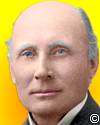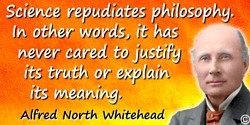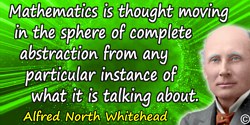 (source)
(source)
|
Alfred North Whitehead
(15 Feb 1861 - 30 Dec 1947)
English mathematician and philosopher who worked in logic, physics, and later in his life spent more time on the philosophy of science and metaphysics. He worked with Bertrand Russell on Principia Mathematica which shows that logic underlies all mathematics.
|
Alfred North Whitehead Quotes on Invention (5 quotes)
>> Click for 138 Science Quotes by Alfred North Whitehead
>> Click for Alfred North Whitehead Quotes on | Application | Civilization | Discovery | Education | Error | Fact | Idea | Imagination | Importance | Knowledge | Learning | Life | Literature | Logic | Mathematics | Mind | Particular | Philosophy | Progress | Science | Thought | Truth |
>> Click for 138 Science Quotes by Alfred North Whitehead
>> Click for Alfred North Whitehead Quotes on | Application | Civilization | Discovery | Education | Error | Fact | Idea | Imagination | Importance | Knowledge | Learning | Life | Literature | Logic | Mathematics | Mind | Particular | Philosophy | Progress | Science | Thought | Truth |
Inventive genius requires pleasurable mental activity as a condition for its vigorous exercise. “Necessity is the mother of invention” is a silly proverb. “Necessity is the mother of futile dodges” is much closer to the truth. The basis of growth of modern invention is science, and science is almost wholly the outgrowth of pleasurable intellectual curiosity.
— Alfred North Whitehead
In 'Technical Education and Its Relation to Science and Literature', The Aims of Education and Other Essays (1917), 69.
It is impossible not to feel stirred at the thought of the emotions of man at certain historic moments of adventure and discovery—Columbus when he first saw the Western shore, Pizarro when he stared at the Pacific Ocean, Franklin when the electric spark came from the string of his kite, Galileo when he first turned his telescope to the heavens. Such moments are also granted to students in the abstract regions of thought, and high among them must be placed the morning when Descartes lay in bed and invented the method of co-ordinate geometry.
— Alfred North Whitehead
Quoted in James Roy Newman, The World of Mathematics (2000), Vol. 1, 239.
The greatest invention of the nineteenth century was the invention of the method of invention.
— Alfred North Whitehead
In Science and the Modern World (1925, 1997), 96.
The invention of the differential calculus marks a crisis in the history of mathematics. The progress of science is divided between periods characterized by a slow accumulation of ideas and periods, when, owing to the new material for thought thus patiently collected, some genius by the invention of a new method or a new point of view, suddenly transforms the whole subject on to a higher level.
— Alfred North Whitehead
In An Introduction to Mathematics (1911), 217. Whitehead continued by quoting the poet, Percy Shelley, who compared the slow accumulation of thoughts leading to an avalanche following the laying down of a great truth. See the poetic quote beginning, “The sun-awakened avalanche…” on the Percy Shelley Quotations page.
What is peculiar and new to the [19th] century, differentiating it from all its predecessors, is its technology. It was not merely the introduction of some great isolated inventions. It is impossible not to feel that something more than that was involved. … The process of change was slow, unconscious, and unexpected. In the nineteeth century, the process became quick, conscious, and expected. … The whole change has arisen from the new scientific information. Science, conceived not so much in its principles as in its results, is an obvious storehouse of ideas for utilisation. … Also, it is a great mistake to think that the bare scientific idea is the required invention, so that it has only to be picked up and used. An intense period of imaginative design lies between. One element in the new method is just the discovery of how to set about bridging the gap between the scientific ideas, and the ultimate product. It is a process of disciplined attack upon one difficulty after another This discipline of knowledge applies beyond technology to pure science, and beyond science to general scholarship. It represents the change from amateurs to professionals. … But the full self-conscious realisation of the power of professionalism in knowledge in all its departments, and of the way to produce the professionals, and of the importance of knowledge to the advance of technology, and of the methods by which abstract knowledge can be connected with technology, and of the boundless possibilities of technological advance,—the realisation of all these things was first completely attained in the nineteeth century.
— Alfred North Whitehead
In Science and the Modern World (1925, 1997), 96.
See also:
- 15 Feb - short biography, births, deaths and events on date of Whitehead's birth.
- Science and the Modern World, by Alfred North Whitehead. - book suggestion.




 In science it often happens that scientists say, 'You know that's a really good argument; my position is mistaken,' and then they would actually change their minds and you never hear that old view from them again. They really do it. It doesn't happen as often as it should, because scientists are human and change is sometimes painful. But it happens every day. I cannot recall the last time something like that happened in politics or religion.
(1987) --
In science it often happens that scientists say, 'You know that's a really good argument; my position is mistaken,' and then they would actually change their minds and you never hear that old view from them again. They really do it. It doesn't happen as often as it should, because scientists are human and change is sometimes painful. But it happens every day. I cannot recall the last time something like that happened in politics or religion.
(1987) -- 


